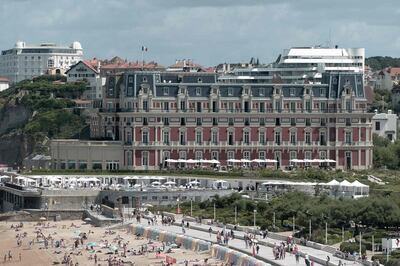The Group of Seven summit starts next Saturday and is always a good barometer of the global balance of power.
One yardstick is the number following the "G", which denotes the number of countries in the group. Membership has fluctuated over time in response to shifting political considerations.
Another measure lies in the mix of leaders around the table. This year the telling difference is not the size but the sympathies of those who will gather in Biarritz on the French Atlantic seaboard.
A significant caucus in the room have risen to the top on the basis of nationalist political agendas.
At a time when world stock markets are wobbling like blancmange, that is bound to detract from the effective partnership on managing the global economy that gives the summit its edge.
The G7 was the G6 when the first meeting took place in France in 1975. It was the apex of the western club of nations. The idea was that like-minded leaders could use the opportunity of being at close quarters for a prolonged period of time to address pressing issues together.
The post-Cold War expansion to a G8 format was last seen at an Irish golf course resort and hosted by then British prime minister David Cameron in Enniskillen in 2012. The group has since shrunk back again to mostly western liberal democracies but new divisions are likely to dominate next weekend.
Since the inaugural meeting, the three main topics have been about boosting inflation-free growth, stopping protectionism in global trade and tackling energy and climate issues.
While the body represents a narrow band at the top of the global order, the discussions have been strongly rooted in the idea of shared interdependence.
The outlook of the meetings has been that making international rules stronger promotes a common good.
Within that framework, there have been many successes, including the World Trade Organisation and successive rounds of trade liberalisation. Effective actions such as addressing the Latin American debt crisis in the 1980s and co-ordinating the immediate response to the 2008 financial crisis have been the result of previous summits.
There been immense thematic changes as well. Development aid has expanded and moved to the heart of global relationships since 1975. And without the G7 or G8, it is unlikely we would have the global climate change agreements that, whatever disputes still rage, provide some fight back against global warming.
It is unlikely that most, or any, of this will matter when US President Donald Trump touches down in Biarritz.
The legacy of the resort’s own belle epoque past is unlikely to have much impact either, which is a shame. In the 1880s there was nowhere more fashionable that Biarritz, which was a celebration of another era of prosperity. Crowned heads of Europe bathed in its spas and promenaded along the strands.
That “beautiful era” was eclipsed by the rise of nationalist and imperial antagonism from the next generation of that small group of leaders.
Mr Trump has from the outset of his presidency spurned the climate change consensus. A series of trade disputes and escalating tariff war with China has shredded progress towards liberalisation. The US president has said trade wars are easy for the US to win. He also holds the opinion that tariff revenues represent a fiscal bonanza for the US.
The G7 meetings represents a second phase for the Trump administration's foreign policy. Reports suggest Mr Trump plans to meet Boris Johnson, the new British prime minister, before other Europeans.
That would be a pointed endorsement of London’s push to leave the EU without an agreed exit plan – a disruptive breach that would set Britain firmly on a course away from Europe. Next to America First, a no-deal Brexit would be the greatest nationalist assertion seen among the G7 members in its history.
Meanwhile, also around the table will be Giuseppe Conte, the Italian prime minister, who could lose his job this week after the nationalist Lega party demanded a general election and pushed for a no-confidence vote.
The White House has a Brexit project. It is offering fast trade deals to offset the UK loss of access to European markets. It claims these can be piecemeal, something that is against WTO rules. At the very least, the G7 pretence of acting as the guardian of global rules rings hollow.
At this level, every action has a reaction or a cascade of consequences. Britain leaving the EU is igniting nationalist passions within its own borders. The case for a Scottish referendum on independence is growing.
Within Ireland, both north and south of the border, a new debate is kicking off on what unification of the island free of British rule would look like.
Meanwhile the markets place no store in a communique from Biarritz. Officials fear there will be no communique issued at all – another first. Nor has there been any serious momentum behind diplomatic peace-brokering initiatives proposed for this year’s G7.
Economic problems are hostage to a rapidly entrenching new political landscape.



